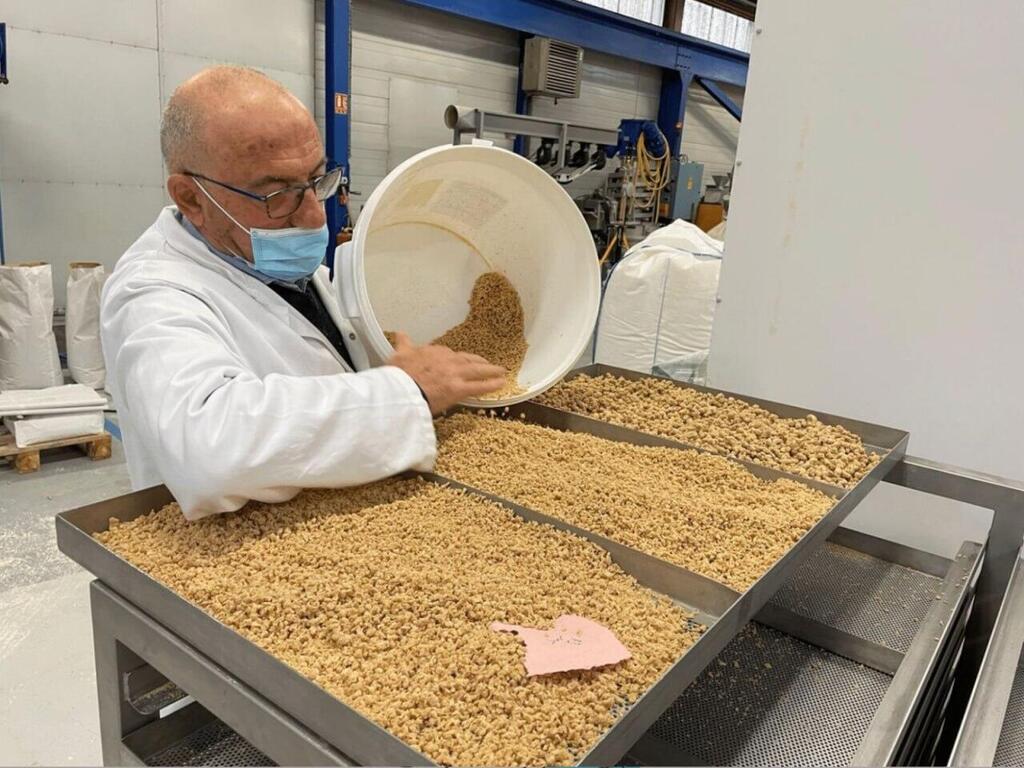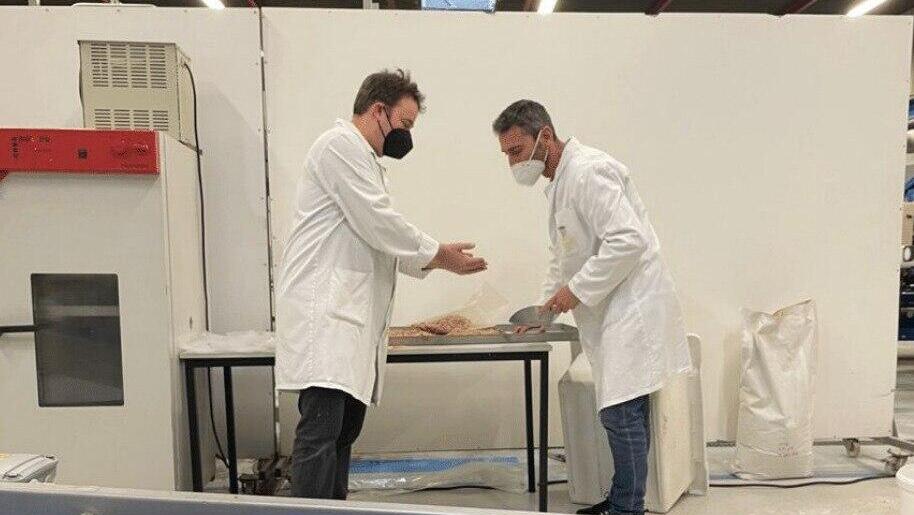The Israeli company Gaius AI is discussing a groundbreaking advancement achieved in the last 12 months with the world’s top food manufacturers.
This breakthrough enables the integration of AI into the navigation and control of extrusion machines, promising substantial cost savings and a near-complete reduction of certain types of food waste.
“We are the only company in the world that offers to use computational biology to control these massive extrusion machines,” said Dr. Yishai Mishor, founder and CEO of Gaius AI. “Our platform seamlessly integrates with existing machinery.”
Mishor is perhaps best known for his role as founder of “Meat. The End,” which develops protein ingredients that transform the texture of alternative meat. Meat. The End works with Burger King.
Since the war started on October 7, 2024, Mishor has spent three months on reserve duty and then had to move his family abroad to Miami and New York to help manage his company, given the challenges in Israel. Nonetheless, his company has made a breakthrough, and Mishor is confident it will be the next big thing in the food production industry.
Gaius AI’s AI technology makes real-time, autonomous adjustments to production equipment, revolutionizing a $360 billion food market, cutting costs and enhancing quality in major categories like snacks, cereals, pet food and meat alternatives.
“The vision is that not too many years from now – five or less – AI will control food production,” Mishor said.
Mass food production often leads to significant waste, with tons of raw materials like starches, corn flour and soy proteins discarded daily. Extrusion, a widely used process in food manufacturing, combines high temperatures, pressure and shearing at low moisture levels, playing a crucial role across many industries.
Gaius AI’s technology integrates seamlessly with existing machinery, offering real-time, autonomous adjustments to the extrusion process. This innovation nearly eliminates raw material waste caused by these machines in mass food production.
“We’re enhancing production accuracy, making machine operation far more efficient,” Mishor said.
Mishor attributed the company’s success during the war to its dual identity as both an Israeli and European company, with the other half of its team based in Munich.
IIA: 55% drop in fundraising
The high-tech industry is essential for the Israeli economy. Before the war, it was providing around 19.7% of gross domestic product and 53% of exports, according to the Israel Innovation Authority (IIA). However, the war has led to a significant decline in fundraising, with a 55% drop in 2023 compared to 2022, and increased investor caution, particularly among those unfamiliar with investing in conflict zones – putting Israel’s high-tech industry at risk.
To help offset the challenges, particularly in the regions hardest hit by the war, the IIA, Ministry for the Development of the Negev, Galilee and National Resilience, the Tekuma Authority, and the Social Equality Ministry recently announced a 35 million shekel fund to encourage high-tech companies to expand into those regions. The funding is part of the IIA’s “Leap to High-Tech” program and will support high-tech companies’ interest in opening branches in these areas to hire local talent.
Companies will be able to receive financial support for practical training for inexperienced employees and funding for experienced employees who will mentor new hires through on-the-job training. Companies will have six months to launch their branches and up to 24 months to complete the execution.
In addition, these companies can receive up to 70% of the approved budget for their project.
“Especially during these complex times, we see great importance in developing human capital in the Negev and Galilee as a significant anchor for the growth of high-tech companies,” said Yohanan Mali, director-general of the Ministry for the Development of the Negev, Galilee and National Resilience. “This program marks a turning point in the development of the Negev and Galilee, strengthening economic and employment resilience. It is another step we are taking in partnership with other entities to promote economic development and demographic growth in these regions.”
Enduring spirit
Dig Robotics is a company that already aimed to have a company in the south.
CEO Noam Rotem and his partners Dr. Oded Medina and Ken Gray founded Dig Robotics in Nir Am on October 5, only two days before the war started. The company optimizes heavy machinery operations in the mining and construction industries by installing sensor suits and analyzing information. Nir Am was one of the southern communities hardest hit by the massacre.
Despite the immense challenges posed by the situation, Dig Robotics continues to push forward, demonstrating the enduring spirit of Israeli innovation.
Dig Robotics’ team worked from their homes for the first few months since the attack. Then, in March, the company was accepted to a three-month TechStars accelerator program in the U.S., which included a first investment from TechStars. Now, they are back in Israel.
“Coming back to Israel, we started a pilot with a large Israeli mining company and received a large grant from the Israel Innovation Authority. We are now preparing for a demo at the end of September for a large US-based excavation company and our first paid pilot with an earthmoving contractor in Oklahoma,” shared Rotem.
The startup plans to raise $3 million in six months to eight months to continue developing technology and introduce the first commercial product.
“The events of October 7 and the war and everything that’s going on is such a big, difficult issue that it’s hard to think about how it’s affected me because so many people were affected so much worse than we were,” Rotem told The Media Line. “On a practical level, surely, it was challenging. Investors are cautious about investing in Israeli tech companies. We order a lot of our electronics and components from abroad. It’s difficult even to get components because there are no flights. It’s not even a matter of price; it’s people saying, ‘No, we can’t send you materials.’“
He said raising funds has taken longer since October 7. Companies have to talk to more investors to find the right ones. There is also the risk that an escalation could shut operations down, even if only temporarily.
“We have a demo in the U.S., in Colorado, a month from now,” Rotem said. “We’re hoping that we’ll be able to fly. Everybody is working day and night to get ready, but if something happens, as things tend to happen in the last 11 months here in Israel, it’s possible that there won’t be any flights for two weeks, and all this demo will go down the drain. It’s very difficult logistically and planning-wise and stressful.”
Another company, Cytactic, has been struggling to operate with so many of its staff in reserve duty. Yet, the company said that business has gone up.
Cytactic is a digital cyber crisis readiness management platform that offers a comprehensive, data-driven solution. The platform aims to prepare organizations for a potential cyber attack by aligning with their specific cyber threat landscape, allowing for effective crisis management and swift recovery, all in one place. The platform was developed in response to many organizations’ significant losses from cyber incidents.
“One could guess that if you get hit by a war and many team members are called up to the military, it will hold back your operation,” said CEO Nimrod Kozlovski. “The opposite happened. We just realized our team’s strength and our company’s resilience. When one team member was called up to the army reserves, another covered for them or took their task.”
Kozlovski was called to reserves for two-and-a-half months, yet the company continued to thrive. Cytactic hasn’t seen any effect on business or demand.
“One may even say that the opposite happened – we saw more demand for solid technologies and solutions in the cyber crisis management space,” Kozlovski said. “We have the most experienced team in cyber crisis management. We’ve handled over 100 crises, including homeland security, ransomware attacks on hospitals, and data theft from sensitive infrastructures.”
He noted that part of the reason could be that the company’s SaaS platform is primarily aimed at the U.S. and, more recently, the EU markets.
“While Israeli clients were great design partners, our main target market remains the U.S.,” he said.
Dig Robotics CEO Rotem said the message is that even in the shadow of war, Israel still generates tremendously innovative tech, which is attractive to investors.
“I think anybody who is working in a startup is very passionate about what they do. It’s especially difficult being in a startup living in Israel,” Rotem said. “On the other hand, I think this innate difficulty drives us to work hard both in startups and as Israelis.”
- The story is written by Maayan Hoffman and Veronica Neifakh and reprinted with permission from The Media Line.







